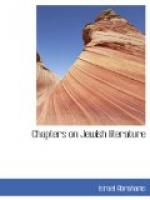Saadiah’s Arabic version of the Scriptures won such favor that it was read publicly in the synagogues. Of old the Targum, or Aramaic version, had been read in public worship together with the original Hebrew. Now, however, the Arabic began to replace the Targum. Saadiah’s version well deserved its honor.
Saadiah brought a hornet’s nest about his head by his renewed attacks on Karaism, contained in his commentary to Genesis. But the call to Sura turned Saadiah’s thoughts in another direction. He found the famous college in decay. The Exilarchs, the nominal heads of the whole of the Babylonian Jews, were often unworthy of their position, and it was not long before Saadiah came into conflict with the Exilarch. The struggle ended in the Gaon’s exile from Sura. During his years of banishment, he produced his greatest works. He arranged a prayer-book, wrote Talmudical essays, compiled rules for the calendar, examined the Massoretic works of various authors, and, indeed, produced a vast array of books, all of them influential and meritorious. But his most memorable writings were his “Commentary on the Book of Creation” (Sefer Yetsirah) and his masterpiece, “Faith and Philosophy” (Emunoth ve-Deoth).
This treatise, finished in the year 934, was the first systematic attempt to bring revealed religion into harmony with Greek philosophy. Saadiah was thus the forerunner, not only of Maimonides, but also of the Christian school-men. No Jew, said Saadiah, should discard the Bible, and form his opinions solely by his own reasoning. But he might safely endeavor to prove, independently of revelation, the truths which revelation had given. Faith, said Saadiah again, is the sours absorption of the essence of a truth, which thus becomes part of itself, and will be the motive of conduct whenever the occasion arises. Thus Saadiah identified reason with faith. He ridiculed the fear that philosophy leads to scepticism. You might as well, he argued, identify astronomy with superstition, because some deluded people believe that an eclipse of the moon is caused by a dragon’s making a meal of it.
For the last few years of his life Saadiah was reinstated in the Gaonate at Sura. The school enjoyed a new lease of fame under the brilliant direction of the author of the great work just described. After his death the inevitable decay made itself felt. Under the Moorish caliphs, Spain had become a centre of Arabic science, art, and poetry. In the tenth century, Cordova attained fame similar to that which Athens and Alexandria had once reached. In Moorish Spain, there was room both for earnest piety and the sensuous delights of music and art; and the keen exercise of the intellect in science or philosophy did not debar the possession of practical statesmanship and skill in affairs. In the service of the caliphs were politicians who were also doctors, poets, philosophers, men of science. Possession of culture was, indeed,




